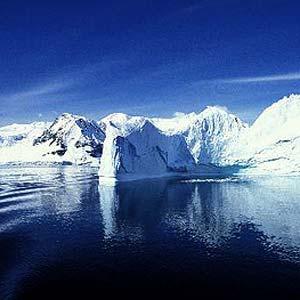Source: Xinhua
02-26-2009 10:52
Special Report: Tech MaxGENEVA, Feb. 25 (Xinhua) -- Snow and ice are declining fast in both polar regions, fueling climate change as well as sea level rising, according to major scientific study released on Wednesday.
 |
| Snow and ice are declining fast in both polar regions, fueling climate change as well as sea level rising.(File photo) |
The ice melt is affecting human livelihoods as well as local plant and animal life in the Arctic, as well as global ocean and atmospheric circulation and sea level, said the "State of Polar Research" report, which was compiled by scientists for the 2007-2008 International Polar Year (IPY).
"It now appears certain that both the Greenland and the Antarctic ice sheets are losing mass and thus raising sea level, and that the rate of ice loss from Greenland is growing," the report said.
"New data also confirm that warming in the Antarctic is much more widespread than it was thought," it added.
The wide-ranging IPY findings result from more than 160 science projects assembled from researchers in more than 60 countries, the World Meteorological Organization and the International Council for Science said in a statement.
Launched in March 2007, the IPY covers a two-year period to March 2009 to allow for observations during the alternate seasons in both polar regions, the statement said.
"The International Polar Year 2007-2008 came at a crossroads for the planet's future," said Michel Jarraud, secretary-general of WMO.
"The new evidence resulting from polar research will strengthen the scientific basis on which we build future actions," he added.
According to the report, researchers found that in the Arctic, during the summers of 2007 and 2008, the minimum extent of year-round sea ice decreased to its lowest level since satellite records began 30 years ago.
IPY expeditions also recorded an unprecedented rate of sea-ice drift in the Arctic. Due to global warming, the types and extent of vegetation in the Arctic shifted, affecting grazing animals and hunting.
Other evidence for global warming comes from IPY research vessels that have confirmed above-global-average warming in the southern ocean around Antarctica.
A freshening of the bottom water near Antarctica is consistent with increased ice melt from Antarctica and could affect ocean circulation. Global warming is thus affecting Antarctica in ways not previously identified.
-- Click for more news in Tech Max >>
Editor:Yang Jie
